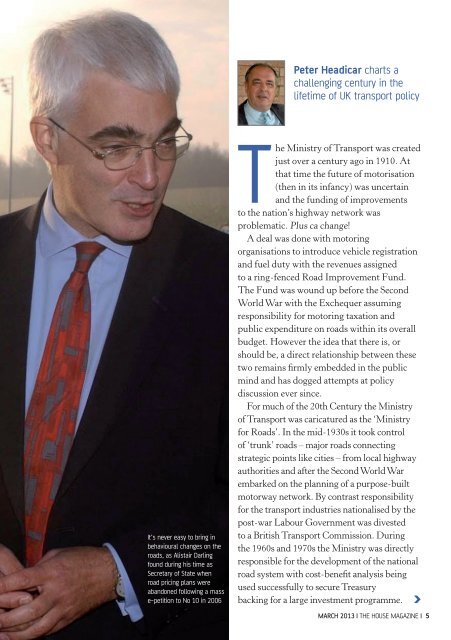Department
Department
Department
You also want an ePaper? Increase the reach of your titles
YUMPU automatically turns print PDFs into web optimized ePapers that Google loves.
It’s never easy to bring in<br />
behavioural changes on the<br />
roads, as Alistair Darling<br />
found during his time as<br />
Secretary of State when<br />
road pricing plans were<br />
abandoned following a mass<br />
e-petition to No 10 in 2006<br />
Peter Headicar charts a<br />
challenging century in the<br />
lifetime of UK transport policy<br />
The Ministry of Transport was created<br />
just over a century ago in 1910. At<br />
that time the future of motorisation<br />
(then in its infancy) was uncertain<br />
and the funding of improvements<br />
to the nation’s highway network was<br />
problematic. Plus ca change!<br />
A deal was done with motoring<br />
organisations to introduce vehicle registration<br />
and fuel duty with the revenues assigned<br />
to a ring-fenced Road Improvement Fund.<br />
The Fund was wound up before the Second<br />
World War with the Exchequer assuming<br />
responsibility for motoring taxation and<br />
public expenditure on roads within its overall<br />
budget. However the idea that there is, or<br />
should be, a direct relationship between these<br />
two remains firmly embedded in the public<br />
mind and has dogged attempts at policy<br />
discussion ever since.<br />
For much of the 20th Century the Ministry<br />
of Transport was caricatured as the ‘Ministry<br />
for Roads’. In the mid-1930s it took control<br />
of ‘trunk’ roads – major roads connecting<br />
strategic points like cities – from local highway<br />
authorities and after the Second World War<br />
embarked on the planning of a purpose-built<br />
motorway network. By contrast responsibility<br />
for the transport industries nationalised by the<br />
post-war Labour Government was divested<br />
to a British Transport Commission. During<br />
the 1960s and 1970s the Ministry was directly<br />
responsible for the development of the national<br />
road system with cost-benefit analysis being<br />
used successfully to secure Treasury<br />
backing for a large investment programme.<br />
March 2013 | THE HOUSE MAGAZINE | 5


